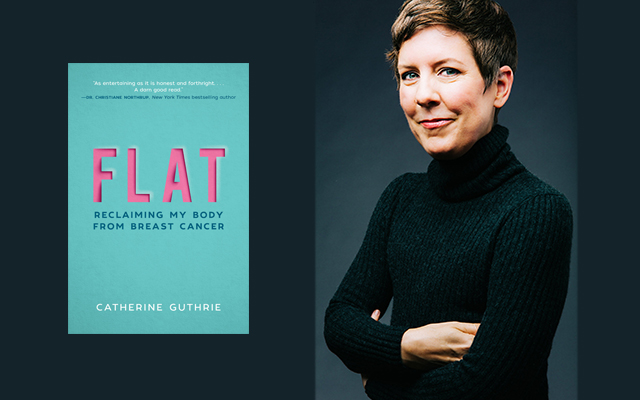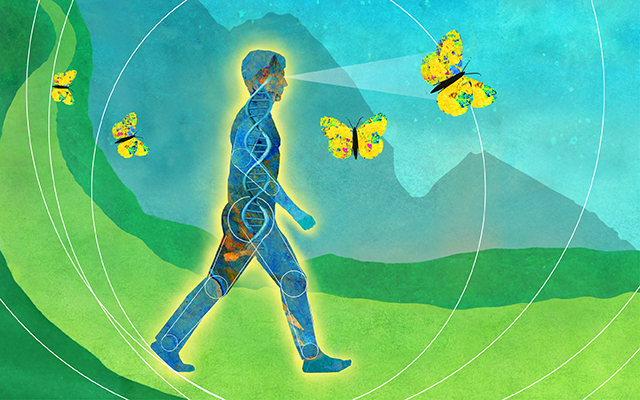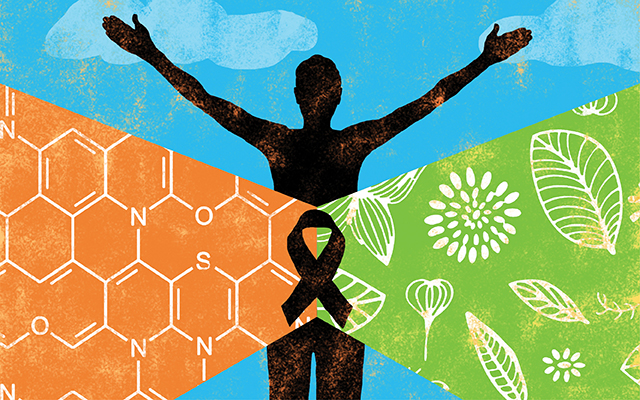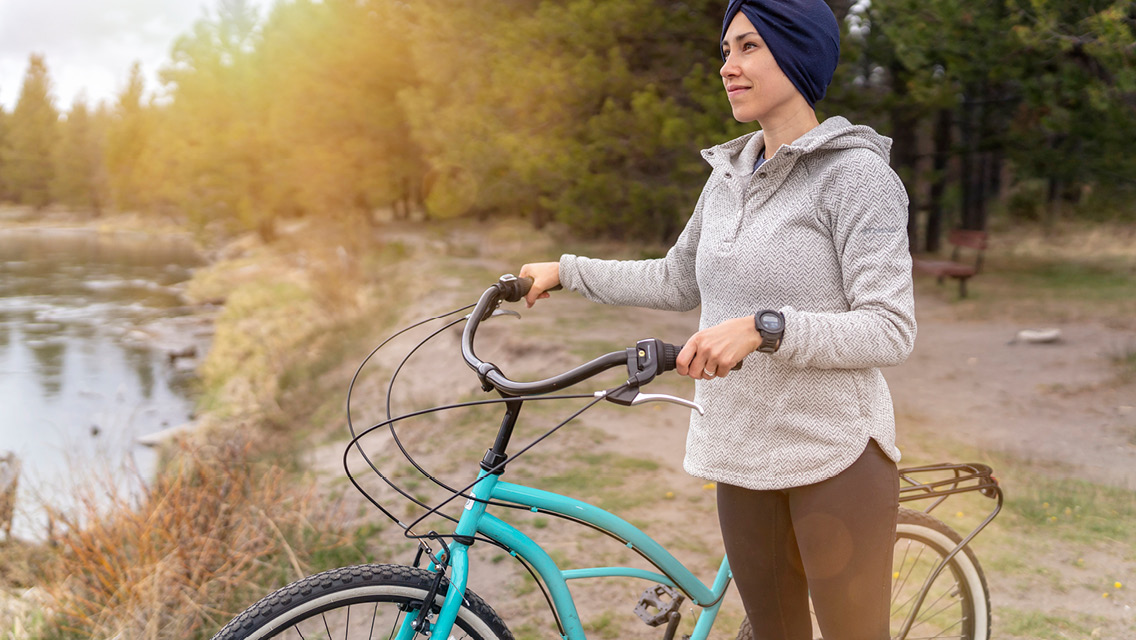When faced with a breast-cancer diagnosis, health journalist Catherine Guthrie chose to have a double mastectomy without reconstruction for reasons that were both practical and personal.
Guthrie’s new memoir, FLAT: Reclaiming My Body from Breast Cancer, chronicles the realities she faced navigating her experience with breast cancer, including the physical and emotional traumas of mastectomy, radiation, and chemotherapy. She documents her struggle with dismissive and paternalistic caregivers, as well as two potentially life-altering medical errors.
FLAT shines a light on assumptions that some surgeons and other healthcare providers make about women’s bodies. With great insight and self-awareness, she explores the challenges of being a patient advocate.
Experience Life | As the title of your book suggests, your story is largely about your relationship with your body and how it was affected by breast cancer. Why was this an important story to tell — for yourself and for other women?
Catherine Guthrie | Before my breast-cancer diagnosis, I was very tuned in to my body thanks to yoga and my job as a women’s health journalist. My deep comfort with my body was also largely enabled by coming out as queer in my early 20s. As I wrote in my book, “Because I no longer wanted to be desired by men, I was free to explore what I desired for myself.” So it was shocking when, in my late 30s, my breast-cancer diagnosis thrust me into the breast-cancer industrial complex where all of my healthcare providers insisted that breast reconstruction was vital to my mental health.
Because breasts are objectified in our culture, breast cancer can feel like a threat to a woman’s value. If our “worth” is reduced to our breasts, then naturally the assumption is that a woman must do everything she can to save her breasts.
Breast-cancer patients are told they need to reconstruct their breasts to feel “whole.” I understand the desire to return the body to how it looked before cancer. Who doesn’t want to look the same? But that single-pointed focus can override everything else, including a woman’s priorities.
For example, many surgeons do not communicate the downsides of breast reconstructive surgeries. The complication rates range from 20 to 33 percent, yet studies show that only 3 to 15 percent of women know the risks. Studies also show that providers spend much more time talking about the advantges of breast reconstruction than the potential risks. As a result, many breast-cancer patients are blindsided by the reality of their postsurgery bodies. (Read more about Debbie Friedlander harrowing story at “How One Woman Survived Breast Implant Illness.“)
EL | What were your priorities and how did those differ from the assumption that reconstruction would make you feel “whole” again?
CG | My surgeons’ definition of whole was not my definition of whole. To me, being whole meant being strong, confident, and pain-free. Whole meant being able to move my body with freedom and ease. If I had chosen reconstruction, a significant portion of my latissimus dorsi, the largest muscle in my back, would have been severed to make a new breast, and part of my pectoralis muscle would have been separated from its moorings to make a pocket for an implant. That was the only reconstruction option available to someone with my body size. I wasn’t willing to sacrifice part of a back muscle to make a faux breast. Now it’s nine years later and, because I went flat, all my muscles are intact and I’ve regained 100 percent of my pre-surgery strength and range of motion.
I regularly do handstands and headstands in my yoga practice. I love to swim. I love to kayak. Last weekend, without thinking twice, I swept up my 5-year-old nephew and carried him through the house Superman-style. That kind of carefree strength allows me to move through the world with confidence. To me, nothing is more feminine or more “whole” than a strong, confident woman.
EL | What expectations did you have about your ability to navigate the healthcare system, and what would you like others in your position to consider?
CG | I had exceedingly high expectations of myself going into my breast-cancer treatment. I’d written about breast cancer many times. It’s safe to say I was about as prepared as any patient could be. The fact that two horrific errors happened during the course of my care was sobering. Without spoiling any parts of the book, I will say that what I learned is that doctors are human. You do your best to choose top-notch folks, but even they have bad days. In the end, I learned a lot about acceptance, forgiveness, and letting go. But, first and foremost, I learned that you are the best advocate for your care. You’ve got to fight to be heard, and you can’t give up, no matter what.
Further, with regard to dealing with paternalistic attitudes like those I encountered, it’s up to women to upend those assumptions by asking questions and demanding better information from their doctors. Doctors aren’t bad, they are simply steeped in the paternalism that shaped medicine. Women need solid, unbiased information to make fully informed decisions about our bodies. Anything less robs us of our choice and treats us as if we don’t have the wherewithal to make good decisions. Medicine has a long history of policing women’s bodies, and it needs to stop.
EL | You have voiced your skepticisim of the “pink-washing” of breast cancer, including certain corporate-sponsored events and promotions. What is your thinking about breast-cancer walks and other fundraisers as a source of community for survivors?
CG | People are social creatures. We love to congregate around shared interests, and charity walks and fundraisers build community. Where my inner skeptic comes in is when these events become a stage for large corporations to expand their consumer base under the guise of being “do-gooders” for breast cancer. This is called “pink-washing.” My favorite charity, Breast Cancer Action (BCA), defines a pinkwasher as “a company or organization that claims to care about breast cancer by promoting a pink ribbon product, but at the same time produces, manufactures and/or sells products that are linked to the disease.” For example, Susan G. Komen, a giant in the breast-cancer space, commissioned a perfume called “Promise Me” that first contained harmful chemicals. The perfume’s two most problematic ingredients were galaxolide (a hormone disruptor) and toluene (a neurotoxicant). The irony of Susan G. Komen making and distributing a chemical-laden perfume in honor of women with cancer is beyond tone deaf. It’s insulting. Whether you are doing a charity walk or buying a pink-ribbon product, the onus is on you, the consumer, to make sure your intention — to help those suffering with a disease — aligns with that of the sponsoring organization or the product manufacturer. If you aren’t sure or if you don’t have the time and energy to find out (heck, we are all busy, I get it), simply bypass the event or product and send a check straight to the organization of your choice. Odds are much higher that your money will “do good” for a breast-cancer cause if you donate directly.
EL | How have your experiences as a patient within the healthcare system generally and within the breast-cancer-treatment system specifically informed your perspective as a health journalist?
CG | My experience as a patient has made me a better health journalist. I’m more empathetic when interviewing patients, and I’m more willing to press doctors on tough questions. I’ve always been drawn to stories about medical injustice, and my experience as a breast-cancer patient has emboldened me to double my efforts to bring these issues to light. I’m confident that I’ll spend the rest of my career pursuing stories of how inequalities in gender and race affect people’s access to and experience with medical care. I can’t think of a better place to put my energy.
Catherine Guthrie is a Boston-based health journalist and a contributing editor to Experience Life magazine. Her memoir, FLAT: Reclaiming My Body from Breast Cancer, is available from Skyhorse Publishing.




This Post Has 0 Comments